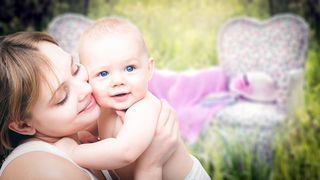Parenting
What Factors Are Associated With Positive Parenting?
Positive parenting is influenced by the child's affection and cognitive ability.
Posted July 15, 2018

A recent study has found that positive parenting is related to certain characteristics of both the mother and the child; and when controlling for maternal factors, only child’s affection (e.g., infant sharing positive feelings and expressions with mother), and general cognitive abilities (e.g., basic problem solving, language abilities) are related to positive parenting.1
The study also found that girls received more positive parenting than boys; the researchers explained this difference in terms of gender differences in affection and cognitive ability, both favoring the girls.
Positive parenting
Before reviewing the details of the study, let us consider the meaning of positive parenting. Positive parenting refers to warm, nurturing, and responsive parenting, the kind of parenting that reinforces good behavior and avoids using inconsistent or harsh discipline.
Positive parenting is associated with many favorable outcomes. Namely, it has been linked to “higher school grades, fewer behavior problems, less substance use, better mental health, greater social competence, and more positive self-concepts.”2
But as the current study’s authors, Woodward et al, note, the dyadic nature of the child/parent behaviors, and how these behaviors relate to positive parenting remains unclear.1 For example, it is not clear which specific child or maternal characteristics are related to positive parenting.
One aspect of responsive parenting is parental warmth. And based on previous research, parental warmth is related to parental temperament (e.g., low levels of neuroticism), mental health, supportive and loving marital relationship, etc.3

But a child’s characteristics can also influence parenting behavior. For instance, a child with greater cognitive abilities or a child who is more affectionate is more likely to receive positive parenting.1
Why? Perhaps because parents find interacting with more cognitively developed children (or more emotionally expressive ones) more rewarding; alternatively, it is possible that positive parenting results in better cognitive development and also encourages more affectionate behaviors.
The study
The current research aimed to examine positive parenting and the associated parental and child characteristics.
The study’s sample consisted of 976 same-gender twins from 488 families.
About 85 percent of the twin pairs were non-Hispanic Caucasian. The ages of the twins’ mothers ranged from 19 to 43 (with an average of 30); in addition, the mothers had 9 to 21 years of education (with an average of 14).
The data were collected when the twins were 7, 9, 14, 24 and 36 months old. The researchers also made recordings of the twins’ mothers as they interacted with their infants.
The researchers found that positive parenting had a significant association with higher levels of maternal education (but not with IQ), and both maternal and paternal martial satisfaction; positive parenting was also positively correlated with a child’s level of affection, stronger expressive and receptive language skills, and general cognitive abilities.
Further analysis also revealed that the only independent correlates of positive parenting were the child’s level of affection and cognitive ability.
Positive parenting: Girls vs. boys
Woodward and colleagues also found that girls, in comparison with boys, received more positive parenting. Given that it is unlikely that parents intentionally chose to be more responsive toward their daughters (as opposed to their sons), how can we explain why girls received more positive parenting?
The researchers propose that girls, whether due to biological differences or differences in socialization, show affection more often; displays of affection, of course, can encourage more responsive parenting.

Similarly, because of gender differences in early cognitive and linguistic development, which favor the girls, parents are more likely to find interacting with their daughters rewarding and thus behave more responsively and warmly toward them.
Reflecting on these gender differences and how they affect positive parenting, Woodward and colleagues state that “Parenting interventions may benefit from helping mothers to appreciate that parenting of boys and girls may differ due to affectionate display differences in boys and girls.”
References
1. Woodward, K. E., Boeldt, D. L., Corley, R. P., DiLalla, L., Friedman, N. P., Hewitt, J. K., ... & Rhee, S. H. (in press). Correlates of positive parenting behaviors. Behavior Genetics. doi: 10.1007/s10519-018-9906-2
2. Amato, P. R., & Fowler, F. (2002). Parenting practices, child adjustment, and family diversity. Journal of Marriage and Family, 64, 703-716.
3. Kendler, K. S., Sham, P. C., & MacLean, C. J. (1997). The determinants of parenting: an epidemiological, multi-informant, retrospective study. Psychological Medicine, 27, 549–563.


